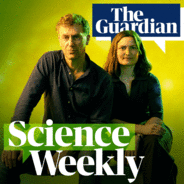Madeleine Finlay is joined by Ian Sample, the Guardian’s science editor and Science Weekly co-host, to answer the questions we are all asking about Covid this autumn, from what is going on with the new variant XEC to how to get a vaccine and what scientists think the government should be doing differently. Help support our independent journalism at theguardian.com/sciencepod

Wissenschaft & Technik
Science Weekly Folgen
Twice a week, the Guardian brings you the latest science and environment news
Folgen von Science Weekly
300 Folgen
-
Folge vom 03.10.2024Everything you need to know about Covid this autumn
-
Folge vom 30.09.2024End of an era: Britain finally says goodbye to coalJust before Britain’s last coal-fired power station, Ratcliffe-on-Soar, powered down for the final time, Madeleine Finlay travelled to Nottinghamshire with energy correspondent Jillian Ambrose for a last tour of the site. Britain is the first major economy to move away from coal entirely as it strives to meet the target of net zero by 2030. Jillian and Madeleine speak to employees to find out what working at the plant has meant to them, and how they’re feeling as the closing date approaches. Help support our independent journalism at theguardian.com/sciencepod
-
Folge vom 26.09.2024Is the ocean becoming too acidic to sustain life?Industrial civilisation is close to breaching a seventh planetary boundary, and may already have crossed it, according to scientists who have compiled the latest report on the state of the world’s life-support systems. They say ocean acidification is close to critical threshold, posing a threat to marine ecosystems and global liveability. Ian Sample speaks to Prof Helen Findlay, a biological oceanographer at the Plymouth Marine Laboratory, to find out why the oceans have reached this state, and whether there is anything we can do to reverse the damage.. Help support our independent journalism at theguardian.com/sciencepod
-
Folge vom 24.09.2024Are the world’s oldest people really that old?Madeleine Finlay speaks to Dr Saul Newman, an interdisciplinary researcher at University College London and the University of Oxford, who has just won an Ig Nobel prize – given to scientific research that ‘first makes people laugh, and then makes them think’ – for his work showing that many claims of people living extraordinarily long lives come from places with short lifespans, no birth certificates, and where clerical errors and pension fraud abound. He tells Madeleine what happened when he went looking for the world’s centenarians, and how his work has been received by the longevity research community. Help support our independent journalism at theguardian.com/sciencepod
